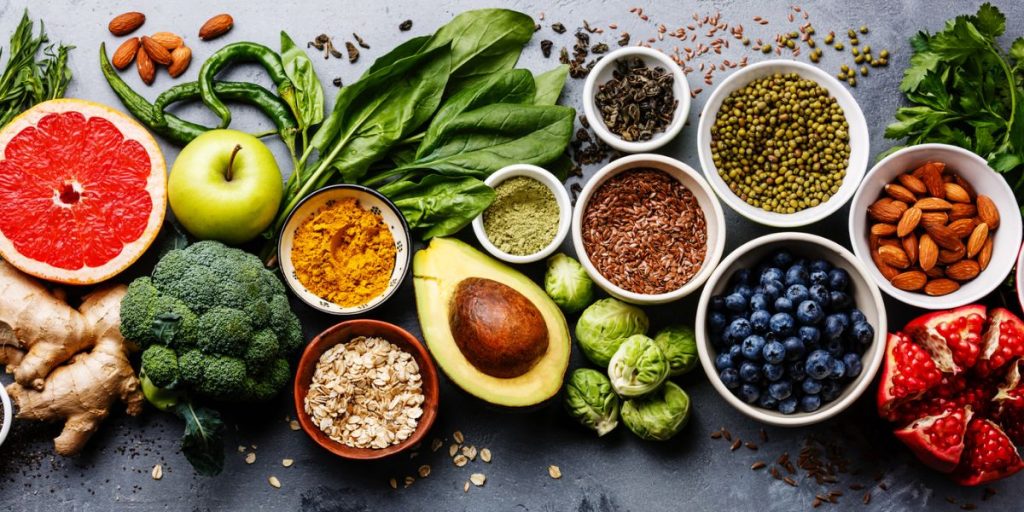
The phrase “superfoods” has become a catchphrase in the constantly changing field of nutrition, connoting extraordinary health advantages. Vitamins, minerals, antioxidants, and other vital substances that support general health are what make these nutrient-dense foods unique. However, how might superfoods improve your health and what are they exactly? Let’s examine the idea of superfoods and learn how adding them to your diet can improve your overall health.
Understanding Superfoods
Superfoods refer to foods that are extraordinarily rich in nutrients, offering significant health benefits with every bite. They often contain high levels of vitamins, minerals, antioxidants, and phytochemicals—compounds that help protect against diseases and support optimal body function. While many superfoods are plant-based, the category also includes nutrient-packed animal products such as fatty fish and fermented dairy. What makes superfoods unique is their ability to deliver concentrated nutrition in relatively small quantities, making them a valuable addition to any diet. However, it’s essential to note that no single food can provide all the nutrients your body needs. A balanced diet rich in a variety of superfoods is the key to unlocking their full potential.
Top Superfoods and Their Benefits
1. Berries (including acai berries and blueberries) Berries are known to contain a lot of antioxidants, especially anthocyanins, which fight inflammation and oxidative stress. Berries, which are rich in vitamins, fiber, and minerals, can improve brain function, support heart health, and encourage healthy skin. They are also a lovely addition to meals and snacks because of their inherent sweetness.
2. Leafy greens, such as Swiss chard, spinach, and kale Rich in vitamins A, C, K, and folate as well as vital minerals like calcium and iron, leafy greens are a nutritional powerhouse. These greens help maintain healthy bones, strengthen the immune system, and promote healthy skin and eyesight. Because of their adaptability, they can be used in a wide range of recipes.
3. Nuts and Seeds (Almonds, Walnuts, Chia Seeds) Nuts and seeds are rich sources of healthy fats, protein, fiber, and essential vitamins. They are particularly beneficial for heart health, weight management, and brain function. For instance, walnuts are rich in omega-3 fatty acids, while chia seeds provide an impressive amount of fiber and plant-based protein.
4. Fatty Fish (Salmon, Sardines, Mackerel) Fatty fish is an excellent source of omega-3 fatty acids, which are essential for cardiovascular health, brain function, and reducing inflammation. These fish also provide high-quality protein and vitamin D, supporting bone health and muscle function. Aim to include fatty fish in your diet at least twice a week for optimal benefits.
5. Quinoa As a complete protein source, quinoa is praised for its high protein content and variety of important amino acids. It is also gluten-free. Quinoa is high in fiber, iron, and magnesium, which promotes healthy digestion, strong muscles, and the generation of energy. Because of its adaptability, it’s a great alternative to pasta or rice.
6. Avocados A nutrient-dense fruit, avocados are high in fiber, potassium, and good monounsaturated fats. They support heart health, increase satiety, and reduce bad cholesterol. Vitamins C, E, K, and B-6, which are essential for general health, are also abundant in avocados.
7. Green Tea Antioxidants, especially catechins, which are abundant in green tea, have been connected to enhanced cognitive function, fat burning, and a lower chance of developing several types of cancer. It is also a calming beverage that can be consumed on a daily basis due to its anti-inflammatory qualities.
8. Dark Chocolate Moderate consumption of dark chocolate (at least 70% cocoa) provides a plethora of antioxidants, including flavonoids that support brain and heart health. Additionally, it can elevate mood by increasing serotonin levels.
Health Benefits of Superfoods
1. Nutrient Density: Superfoods are a convenient way to meet your daily vitamin and mineral needs without consuming too many calories. They provide a nutritional edge that supports overall health and vitality.
2. Antioxidant Power: A lot of superfoods, like berries, green tea, and dark chocolate, are packed with antioxidants, which protect cells from damage caused by free radicals, lowering the risk of chronic diseases like cancer and heart disease.
3. Heart Health: Superfoods like fatty fish, nuts, and leafy greens are great for cardiovascular health because they help lower cholesterol, reduce inflammation, and regulate blood pressure, all of which significantly lower the risk of heart-related conditions.
4. Digestive Health Foods high in fiber, like leafy greens, quinoa, and chia seeds, promote a healthy digestive system. Yogurt and other probiotic-rich superfoods help to maintain a healthy microbiome, which improves gut health even more.
5. Vitality and Mental Acuity: Superfoods high in nutrients provide you a consistent energy boost that keeps you alert and productive all day. Foods high in omega-3, such as salmon, help improve memory and cognitive performance.
How to Incorporate Superfoods into Your Diet
1. Eat Superfoods to Start Your Day Add some berries to your yogurt, smoothie, or oatmeal for a breakfast boost. An additional boost of fiber and omega-3s can be obtained by including flaxseeds or chia seeds.
2. Center Your Meals on Leafy Greens Make salads with arugula, spinach, or kale as the foundation. For a nutrient-dense meal, add them to soups, stews, or even smoothies.
3. Choose Your Snacks Carefully Use a combination of nuts and seeds in place of processed snacks. They are nourishing, portable, and full of nutrients to keep you going.
4. Enjoy Fatty Fish Regularly Include salmon, mackerel, or sardines in your weekly meal plan. Grill, bake, or pan-sear these fish for a flavorful and nutritious main dish.
5. Experiment with Quinoa Swap out rice or pasta for quinoa in your favorite dishes. Use it as a base for salads, add it to soups, or create a hearty breakfast bowl with fruits and nuts.
6. Indulge Smartly Satisfy your sweet tooth with a small serving of dark chocolate. Pair it with a handful of nuts for a heart-healthy treat.
Tips for Selecting and Using Superfoods
1. Choose Fresh and Organic Options: Opt for fresh, organic produce whenever possible to maximize nutrient content and avoid harmful pesticides.
2. Rotate Your Choices: Incorporate a variety of superfoods into your diet to ensure a broad spectrum of nutrients.
3. Be Mindful of Portions: While superfoods are nutritious, moderation is key to maintaining a balanced diet.
4. Read Labels: When buying packaged superfoods like quinoa or yogurt, check for added sugars or preservatives that could diminish their health benefits.
Summary
Superfoods are a treasure trove of nutrients that can significantly enhance your health and well-being. From reducing the risk of chronic diseases to boosting energy and promoting longevity, these foods provide immense benefits when consumed as part of a balanced diet. By incorporating a variety of superfoods into your meals, you can nourish your body, improve your vitality and pave the way for a healthier lifestyle.
The journey to better health starts with simple, intentional choices. Embrace the power of superfoods and unlock the potential of nutrient-rich eating. Whether you’re seeking to improve heart health, enhance digestion, or simply feel more energized, superfoods offer a delicious and sustainable path to optimal wellness. Start exploring today and transform your diet—and your life—one superfood at a time.







